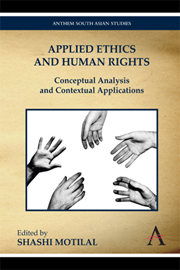Book contents
- Frontmatter
- Contents
- Preface
- Introduction
- Part One Rights, Obligations and Responsibilities
- Part Two Human Rights Issues
- 10 Fragile Identities and Constructed Rights
- 11 Affirmative Action: Compensation or Discrimination?
- 12 Ethics, Human Rights and the LGBT Discourse in India
- 13 Distributive Justice: Locating in Context
- 14 Punishment and Human Rights
- 15 Rights of the ‘Mad’ in Mental Health Sciences
- 16 Choice, Life and the (m)Other: Towards Ethics in/of Abortion
- 17 The Nationalist Project and the Women's Question: A Reading of The Home and the World and Nationalism
- 18 On the Idea of Obligation to Future Generations
- 19 Morality in Cyberspace: Intellectual Property and the Right to Information
- 20 Violence – A Right to the Survival of the Self?
- 21 ‘Moral Obligation’ to Fight for the Prevention of Greater Calamity: A Debate between Sādharana Dharma and Sva Dharma
- 22 Globalisation and Human Rights
- Notes on Contributors
13 - Distributive Justice: Locating in Context
from Part Two - Human Rights Issues
Published online by Cambridge University Press: 05 March 2012
- Frontmatter
- Contents
- Preface
- Introduction
- Part One Rights, Obligations and Responsibilities
- Part Two Human Rights Issues
- 10 Fragile Identities and Constructed Rights
- 11 Affirmative Action: Compensation or Discrimination?
- 12 Ethics, Human Rights and the LGBT Discourse in India
- 13 Distributive Justice: Locating in Context
- 14 Punishment and Human Rights
- 15 Rights of the ‘Mad’ in Mental Health Sciences
- 16 Choice, Life and the (m)Other: Towards Ethics in/of Abortion
- 17 The Nationalist Project and the Women's Question: A Reading of The Home and the World and Nationalism
- 18 On the Idea of Obligation to Future Generations
- 19 Morality in Cyberspace: Intellectual Property and the Right to Information
- 20 Violence – A Right to the Survival of the Self?
- 21 ‘Moral Obligation’ to Fight for the Prevention of Greater Calamity: A Debate between Sādharana Dharma and Sva Dharma
- 22 Globalisation and Human Rights
- Notes on Contributors
Summary
One of the major problems of distributive justice is about the State providing equal opportunity to its citizens to acquire equal resources and, subsequently, attain equal welfare. Though I have used the terms and their relationships little too loosely, their theoretical and praxiological implications are problematic to a large extent. Not only are there difficulties in talking about an ‘objective’ conception of welfare but also in dealing between resources and welfare or between resources and opportunity. Government, providing opportunity to its citizens to enter public sectors in addition to demanding services from its citizens, aims at enabling realisation of welfare for the citizens. On the other side, the nature of welfare's definition may differ from, say, the mental states (qualitative) of the persons concerned to the measure of material wealth people could acquire. Again, measuring welfare in terms of material goods may mean bringing the equality of welfare close to the equality of resources. The problems are indeed wide beyond the purview of this particular paper. I have only tried to glean over a few problems out of the many introduced here.
In this paper I have attempted to highlight only a few problems that crop up with the State's propagation of distributive justice based on economic and social enhancement of a group depending upon certain social criteria. That is, on State's attempt to enhance opportunity to acquire ‘equal’ resources to some of its citizens who are socially and economically backward.
- Type
- Chapter
- Information
- Applied Ethics and Human RightsConceptual Analysis and Contextual Applications, pp. 171 - 182Publisher: Anthem PressPrint publication year: 2010



